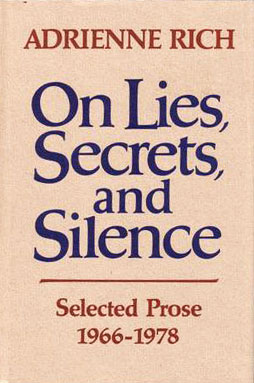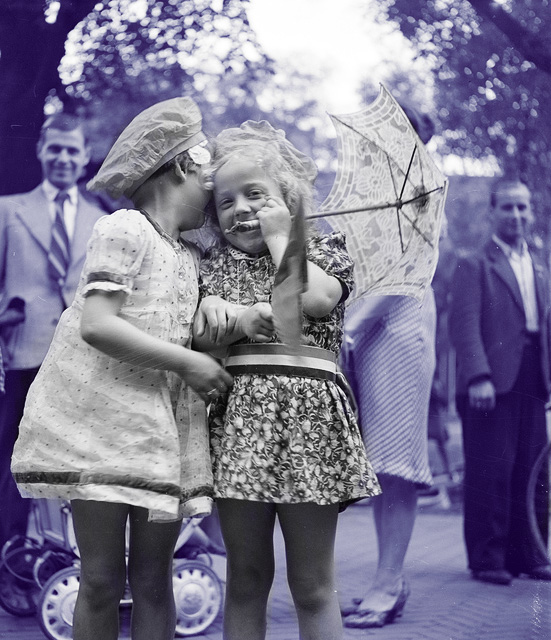Adrienne Rich on Lying, What “Truth” Really Means, and the Alchemy of Human Possibility
by Maria Popova
“The possibilities that exist between two people, or among a group of people, are a kind of alchemy. They are the most interesting thing in life. The liar is someone who keeps losing sight of these possibilities.”
 Long before Sam Harris’s memorable assertion that lying is “both a failure of understanding and an unwillingness to be understood,” long before psychologists identified the four most reliable ways to spot a liar, Adrienne Richwrote beautifully about what is actually at stake when we lie and how lying in all of its permutations — especially those subtle everyday evasions and untruths we tend to attribute to circumstance or to the misguided mercy of sparing others pain — chips away at our basic humanity.
Long before Sam Harris’s memorable assertion that lying is “both a failure of understanding and an unwillingness to be understood,” long before psychologists identified the four most reliable ways to spot a liar, Adrienne Richwrote beautifully about what is actually at stake when we lie and how lying in all of its permutations — especially those subtle everyday evasions and untruths we tend to attribute to circumstance or to the misguided mercy of sparing others pain — chips away at our basic humanity.
In a 1975 speech-turned-essay titled “Women and Honor: Some Notes on Lying,” found in the indispensable volume On Lies, Secrets, and Silence: Selected Prose 1966–1978 (public library | IndieBound) — which also gave us Rich on how relationships refine our truths and her spectacular commencement address on claiming an education — she writes:
Lying is done with words, and also with silence.
Rich considers how, in relationships, we often use lying as a hedge against the discomfort of being truly seen:
The liar lives in fear of losing control. She cannot even desire a relationship without manipulation, since to be vulnerable to another person means for her the loss of control.The liar has many friends, and leads an existence of great loneliness.
But the pathology of lying, she argues, doesn’t merely alienate us from others — it engenders the greatest loneliness of all, by cutting us off from ourselves:
The liar often suffers from amnesia. Amnesia is the silence of the unconscious.To lie habitually, as a way of life, is to lose contact with the unconscious. It is like taking sleeping pills, which confer sleep but blot out dreaming. The unconscious wants truth. It ceases to speak to those who want something else more than truth.
The question of lies, Rich notes, invariably invokes the question of honesty and what “truth” really is:
There is nothing simple or easy about this idea. There is no “the truth,” “a truth” — truth is not one thing, or even a system. It is an increasing complexity. The pattern of the carpet is a surface. When we look closely, or when we become weavers, we learn of the tiny multiple threads unseen in the overall pattern, the knots on the underside of the carpet.This is why the effort to speak honestly is so important. Lies are usually attempts to make everything simpler — for the liar — than it really is, or ought to be.In lying to others we end up lying to ourselves. We deny the importance of an event, or a person, and thus deprive ourselves of a part of our lives. Or we use one piece of the past or present to screen out another. Thus we lose faith even within our own lives.The unconscious wants truth, as the body does. The complexity and fecundity of dreams come from the complexity and fecundity of the unconscious struggling to fulfill that desire.
Pointing out the long history of “the lie as a false source of power,” Rich turns to women’s particular responsibility to one another in matters of truth:
Women have been driven mad, “gaslighted,” for centuries by the refutation of our experience and our instincts in a culture which validates only male experience. The truth of our bodies and our minds has been mystified to us. We therefore have a primary obligation to each other: not to undermine each other’s sense of reality for the sake of expediency; not to gaslight each other.Women have often felt insane when cleaving to the truth of our experience. Our future depends on the sanity of each of us, and we have a profound stake, beyond the personal, in the project of describing our reality as candidly and fully as we can to each other.[...]When a woman tells the truth she is creating the possibility for more truth around her.
This notion of possibility, Rich argues, is central to the power of truth and the peril of lies in all human relationships:
The possibilities that exist between two people, or among a group of people, are a kind of alchemy. They are the most interesting thing in life. The liar is someone who keeps losing sight of these possibilities.When relationships are determined by manipulation, by the need for control, they may possess a dreary, bickering kind of drama, but they cease to be interesting. They are repetitious; the shock of human possibilities has ceased to reverberate through them.
Rich weighs the difference between honesty and oversharing — one particularly poignant today, in an age of compulsive oversharing and very little actual honesty — in the context of honorable human relationships:
It isn’t that to have an honorable relationship with you, I have to understand everything, or tell you everything at once, or that I can know, beforehand, everything I need to tell you.It means that most of the time I am eager, longing for the possibility of telling you. That these possibilities may seem frightening, but not destructive, to me. That I feel strong enough to hear your tentative and groping words. That we both know we are trying, all the time, to extend the possibilities of truth between us.The possibility of life between us.
To fully inhabit this possibility requires, it seems, understanding the subtle but vital difference between trust and faith. Rich considers why “we feel slightly crazy when we realize we have been lied to in a relationship”:
We take so much of the universe on trust. You tell me: “In 1950 I lived on the north side of Beacon Street in Somerville.” You tell me: “She and I were lovers, but for months now we have only been good friends.” You tell me: “It is seventy degrees outside and the sun is shining.” Because I love you, because there is not even a question of lying between us, I take these accounts of the universe on trust: your address twenty-five years ago, your relationship with someone I know only by sight, this morning’s weather. I fling unconscious tendrils of belief, like slender green threads, across statements such as these, statements made so unequivocally, which have no tone or shadow of tentativeness. I build them into the mosaic of my world. I allow my universe to change in minute, significant ways, on the basis of things you have said to me, of my trust in you.[...]When we discover that someone we trusted can be trusted no longer, it forces us to reexamine the universe, to question the whole instinct and concept of trust. For a while, we are thrust back onto some bleak, jutting ledge, in a dark pierced by sheets of fire, swept by sheets of rain, in a world before kinship, or naming, or tenderness exist; we are brought close to formlessness.
Noting that common liar’s excuse of “I didn’t want to cause pain” is merely the liar’s unwillingness to deal with the other’s pain, Rich writes:
The lie is a short-cut through another’s personality.Truthfulness, honor, is not something which springs ablaze itself; it has to be created between people.[...]Truthfulness anywhere means a heightened complexity. But it’s a movement into evolution.
On Lies, Secrets, and Silence is a spectacular read in its totality, a trove of timeless truths spoken by one of the most intensely interesting and important voices of the past century. Complement it with Rich on love, loss, and creativity, why an education is something you claim rather than something you get, hersoul-stirring poem “Gabriel,” and the courageous letter in which she became the only person to decline the National Medal of Arts.


No comments:
Post a Comment